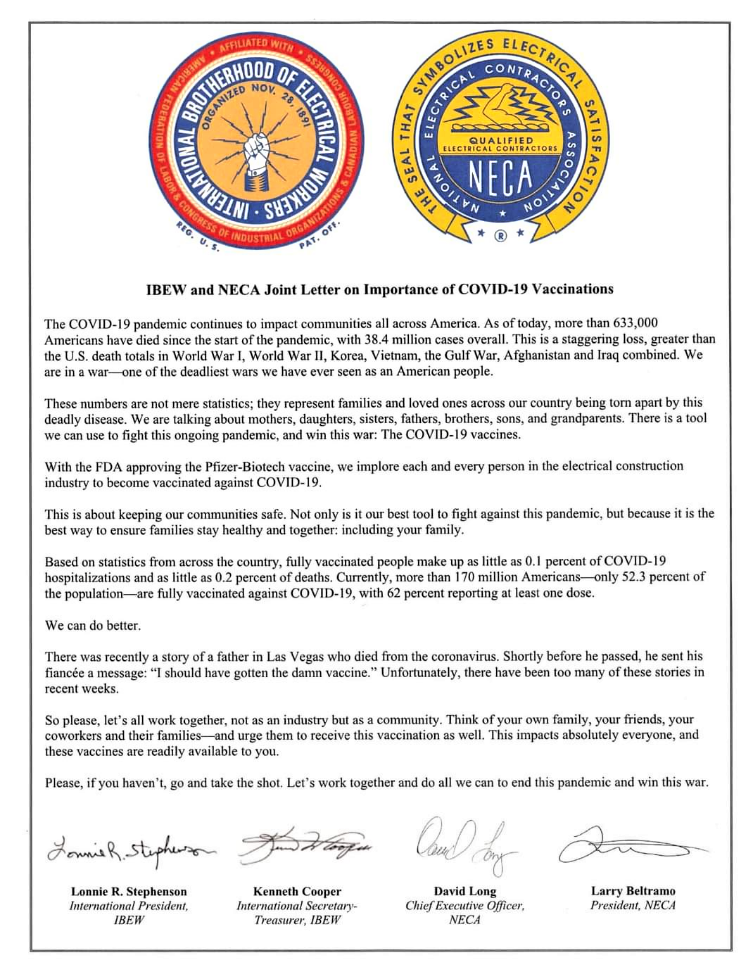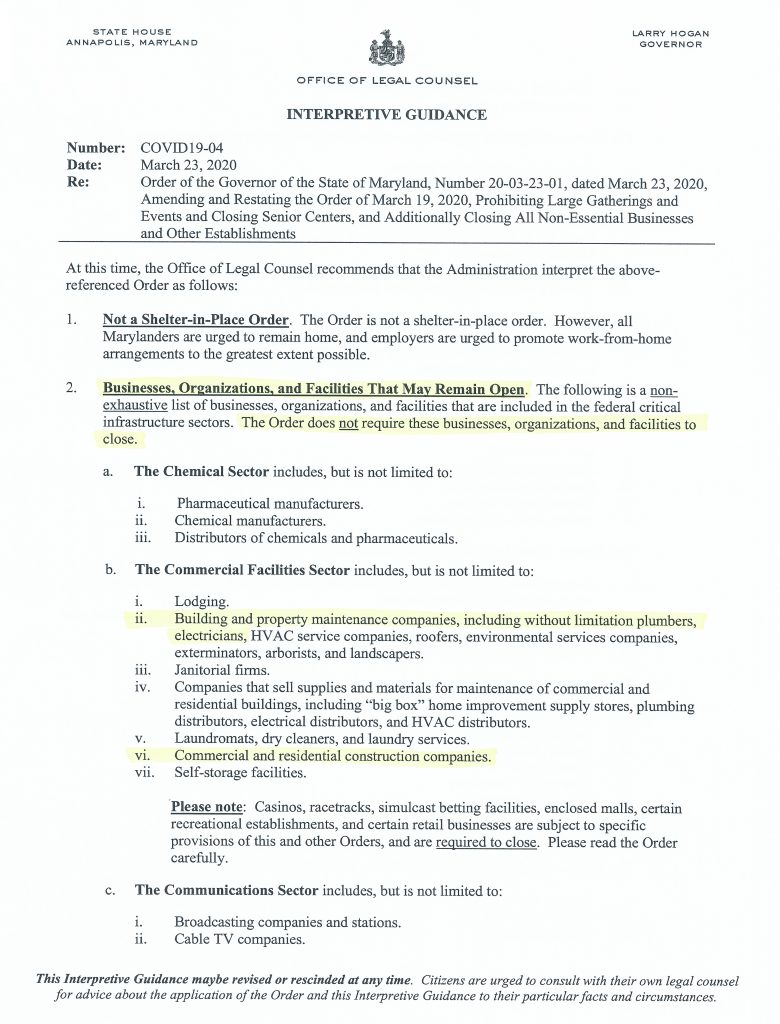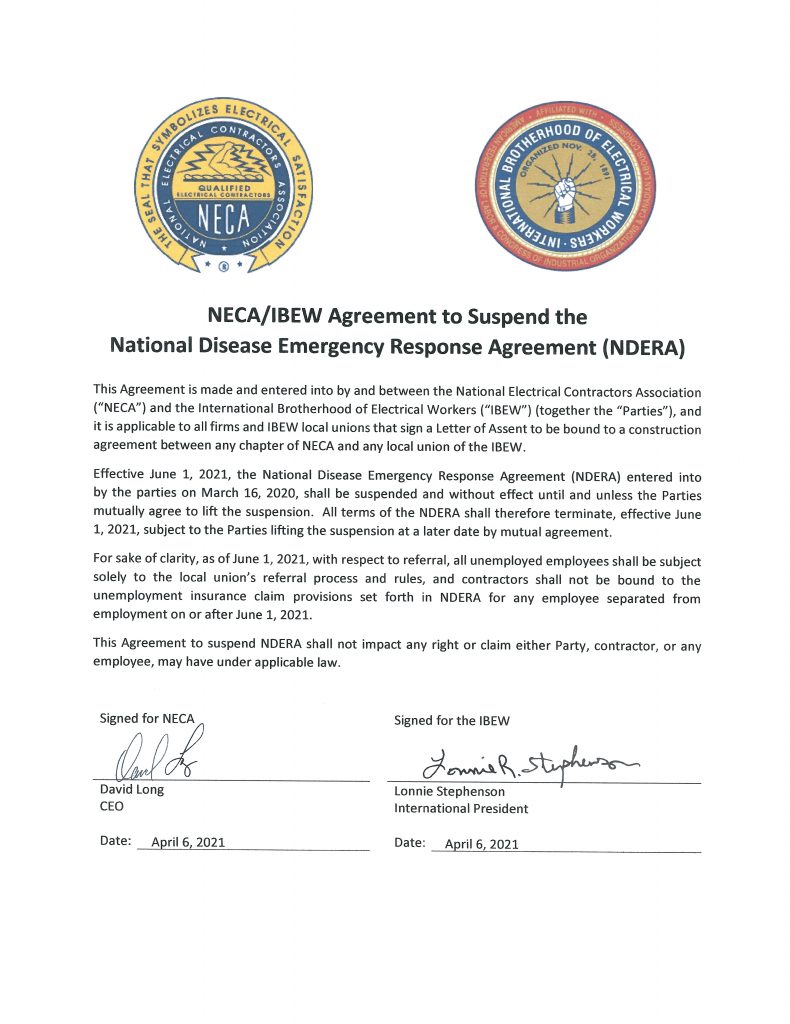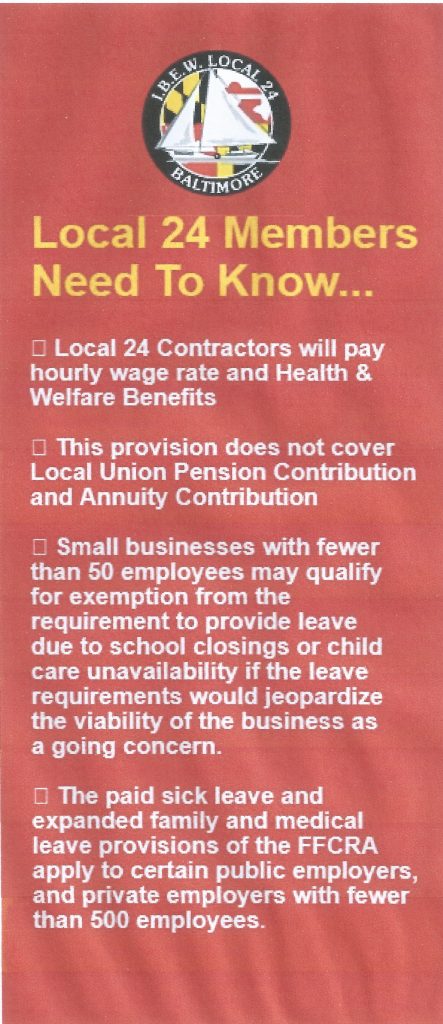
Tag Archives: COVID-19
IBEW and NECA Announce End Date For National Disease Emergency Response Agreement (NDERA)
The NDERA was established more than a year ago in the early days of the Covid-19 pandemic. Leaders from the IBEW and NECA recognized the need for our members to have decision-making capacity to protect their health during a worldwide pandemic, and our contractors’ need to have greater flexibility to protect their business as the economy suffered.
Now that greater numbers of Americans are getting vaccinated every day and our lives are moving toward a “new normal”, both parties agree that it will soon be time to suspend the NDERA. Therefore, earlier this week the IBEW and NECA agreed to suspend the agreement as of June 1, 2021. A copy of the signed agreement is below.
Families First Coronavirus Response Act: Employer Paid Leave Requirements
The Families First Coronavirus Response Act (FFCRA or Act) requires certain employers to provide their employees with paid sick leave or expanded family and medical leave for specified reasons related to COVID-19.[1] The Department of Labor’s (Department) Wage and Hour Division (WHD) administers and enforces the new law’s paid leave requirements. These provisions will apply from the effective date through December 31, 2020.
Under the FFCRA, an employee qualifies for paid sick time if the employee is unable to work (or unable to telework) due to a need for leave because the employee:
- is subject to a Federal, State, or local quarantine or isolation order related to COVID-19;
- has been advised by a health care provider to self-quarantine related to COVID-19;
- is experiencing COVID-19 symptoms and is seeking a medical diagnosis;
- is caring for an individual subject to an order described in (1) or self-quarantine as described in (2);
- is caring for a child whose school or place of care is closed (or child care provider is unavailable) for reasons related to COVID-19; or
- is experiencing any other substantially-similar condition specified by the Secretary of Health and Human Services, in consultation with the Secretaries of Labor and Treasury.
Duration of Leave:
For reasons (1)-(4) and (6): A full-time employee is eligible for up to 80 hours of leave, and a part-time employee is eligible for the number of hours of leave that the employee works on average over a two-week period.
For reason (5): A full-time employee is eligible for up to 12 weeks of leave at 40 hours a week, and a part-time employee is eligible for leave for the number of hours that the employee is normally scheduled to work over that period.
For leave reasons (1), (2), or (3): employees taking leave shall be paid at either their regular rate or the applicable minimum wage, whichever is higher, up to $511 per day and $5,110 in the aggregate (over a 2-week period).
For leave reasons (4) or (6): employees taking leave shall be paid at 2/3 their regular rate or 2/3 the applicable minimum wage, whichever is higher, up to $200 per day and $2,000 in the aggregate (over a 2-week period).
For leave reason (5): employees taking leave shall be paid at 2/3 their regular rate or 2/3 the applicable minimum wage, whichever is higher, up to $200 per day and $12,000 in the aggregate (over a 12-week period—two weeks of paid sick leave followed by up to 10 weeks of paid expanded family and medical leave).
Source: U.S. Department of Labor https://www.dol.gov/agencies/whd/pandemic/ffcra-employer-paid-leave
Coworkers Can Protect Each Other By Wearing Cloth Masks On The Job
Since many Local 24 members continue to report to work on job sites throughout our jurisdiction, our priority is to share any information that will help keep everyone safe and healthy.
The University of Maryland Baltimore (UMB) has just published a policy regarding the use of cloth masks on construction projects, which emphasizes that the cloth masks are an effective way to prevent workers from spreading Covid-19 to their coworkers. Local 24 Business Manager Pete Demchuk has asked the MD NECA chapter to share the policy with all of our signatory contractors, and he is encouraging all our members to wear a cloth mask in situations where social distancing is not possible. The video posted above provides directions to quickly make an easy, no-sew mask using an old t-shirt and 2 rubber bands.
The following are excerpts from UMB’s memo:
On April 3, 2020, the Centers for Disease Control and Prevention (CDC) released a
voluntary Recommendation Regarding the Use of Cloth Face Coverings, Especially in Areas of
Significant Community-Based Transmission. CDC “recommends wearing cloth face coverings in
public settings where other social distancing measures are difficult to maintain (e.g., grocery
stores and pharmacies) especially in areas of significant community-based transmission.”
CDC emphasizes that the use of cloth face coverings complements existing guidelines and does
NOT change the need to follow social distancing and hand-washing guidance. As such, the
University of Maryland, Baltimore (UMB) is adopting the CDC recommendation into its COVID-19
Social Distancing Guidelines.
For situations where it is NOT feasible to maintain at least 6 feet of social distancing, cloth face
coverings should be worn.
Cloth face coverings are NOT intended to protect the individual wearing
the cover and should not be considered personal protective equipment (PPE). Instead, cloth face
coverings are intended to reduce the spread of the virus from people who may be carrying the
virus but are not currently exhibiting symptoms. Therefore, cloth face coverings are intended ONLY
to prevent a person carrying the disease from spreading the virus to otherpeople when interacting
in close proximity (e.g., speaking, coughing, or sneezing).
Contractors working on campus should issue similar guidance about cloth face coverings to their
employees when social distancing is not feasible, and contractors should make efforts to ensure
employees have cloth face coverings or have the ability to make/obtain cloth face coverings.
At UMB, you should wear a cloth face covering when performing all construction activity for which
social distancing cannot be maintained. Examples include:
-
Work activities that require two or more people to complete for which they must come
within 6 feet of contact to perform the task - Interactions with customers in which social distancing is not feasible
- Using public transportation to get to work
CDC advises that surgical masks, N95s, and KN95s are critical supplies that must continue to be
reserved for health care workers and other medical first responders.
MD Electrical Industry Fund Office (Health & Welfare) Restricting Building Access
Local 24 received notification today that the Maryland Electrical Industry Fund (MEIF) office will not allow anyone other than Fund Office employees into the building at all, effective Thursday, April 2, 2020.
This change is, of course, a result of the Covid-19 pandemic and reinforces the MEIF’s efforts to comply with all state guidelines in order to protect MEIF’s employees as well as their participants. Up until now, the participants have been allowed in the lobby only, but that stops effective April 2.
All participants will need to call the Fund Office at 800 352-2741 with any needs or concerns.
Non-Essential Business Closure In Maryland Allows Contractors To Remain Open
 This morning, Maryland Governor Larry Hogan took the next step to “flatten the curve” of the spread of COVID-19 when he announced his order to close all non-essential businesses in our state. Most trades people already know it, but in case there is any doubt, we are in the essential category. Therefore, our signatory contractors and work sites are not required to close under Gov. Hogan’s latest order.
This morning, Maryland Governor Larry Hogan took the next step to “flatten the curve” of the spread of COVID-19 when he announced his order to close all non-essential businesses in our state. Most trades people already know it, but in case there is any doubt, we are in the essential category. Therefore, our signatory contractors and work sites are not required to close under Gov. Hogan’s latest order.
In fact, there is a wide range of occupations and businesses that fall into the “essential” category – a lot more than we would think of, until we were forced to live without them. To help clarify the categories, the Governor’s Office of Legal Counsel has issued this Interpretive guidance , which is based on federal definitions of essential services.
To all of our Local 24 members and the other essential workers who will continue to provide services to their community, we send our gratitude and ask that you remember to take all of the necessary steps to protect yourself from exposure to COVID-19.
Resources For Members During COVID-19 Pandemic
Many organizations that are focused on the well-being of working families are putting together informational guides and publicizing special programs to help alleviate the impact of COVID-19 on our households, our communities and workplaces. Local 24 is sharing these updates as they become available so that our members are aware of available resources.
One of the most devastating effects of the COVID-19 pandemic will be income loss, both for individuals who get sick and for those who are laid off as a result of the drastic slow-down of the U.S. economy. The AFL-CIO, which is an affiliation of most of the labor unions in the United States, has released the AFL-CIO Survival Guide , with many tips on how to survive without a paycheck.
Union Privilege is a nonprofit organization founded by the AFL-CIO in 1986 to provide excellent consumer Union Plus benefit programs exclusively to union members (current and retired) and their families. These programs include mortgage loans, credit cards, discount programs and more. Union Plus is working with its program providers to facilitate additional assistance to members, and you can get the details by reading Union Plus Benefits COVID-19 Special Programs. Please note that some programs, including the hardship programs, do require members to be participants and product holders of those programs and meet certain eligibility requirements to receive benefits. There are over 950,000 credit card holders and over 140,000 mortgage program participants.
IBEW and NECA Announce National Disease Emergency Response Agreement
As concerns surrounding the COVID-19 pandemic mount, Local 24 Business Manager Pete Demchuk has received the following communication and policy from IBEW International President Lonnie Stephenson and National Electrical Contractors Association CEO David Long:
“In recognition of the current emergency in our nation and the need for our industry to react quickly to this and future emergencies, the IBEW and NECA have developed the National Emergency Response Agreement (NDERA) for use by our contractors and members. This agreement provides our industry with the ability to react quickly to potential emergencies related to this pandemic.
The provisions of the agreement will become effective immediately, March 16, 2020, as it is intended for use and shall remain in effect until terminated. We shall meet via teleconference every 30 days to evaluate this agreement and determine its continued utility.”
Regular Membership Meeting Cancelled
❎❎❎ CANCELLATION ANNOUNCEMENT ❎❎❎
The regular membership meeting, originally scheduled for next Tuesday, March 24, 2020 has been cancelled in accordance with MD’s state of emergency and social distancing recommendations.
Tool & Boot Sale and Substance Testing Canceled
Please be advised that our annual Substance Testing and Tool & Boot Sale, originally scheduled for Thursday, March 19 through Saturday, March 21, 2020, has been canceled in light of the growing concerns around COVID-19.
Every effort will be made to reschedule this event once the state of emergency in Maryland has been lifted.



